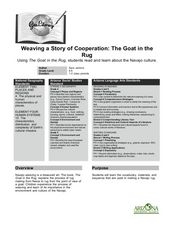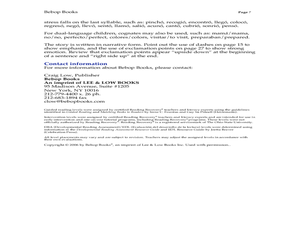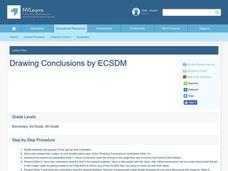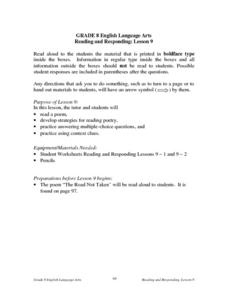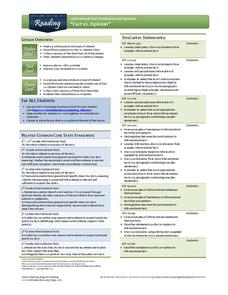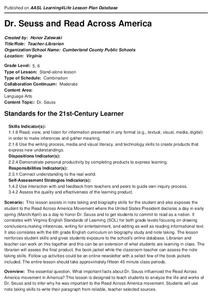Curated OER
Amelia Earhart - Drawing Conclusions
Examine the life of Amelia Earhart with kids. They will read facts and view a timeline about Earhart's life. They will work in groups to read the last radio transmissions and draw conclusions about what happened in her disappearance and...
School Specialty
The Tortoise and the Hare - Drawing Conclusions/Predictions Outcomes
Does the fastest one always win the race? Look deeper into The Tortoise and the Hare with a set of discussion questions for before, during, and after reading the story.
Curated OER
Drawing Conclusions from Historical Fiction
Students read historical fiction. In this drawing conclusions lesson, students learn how to draw conclusions from text, specifically historical fiction. Students read Molly's Pilgrim and complete a graphic organizer where they answer...
Curated OER
Understanding a Story
Reading comprehension is the name of the game! After listening to the teacher model and share personal prior knowledge about small children and what they do with food, the class discusses how they too can use prior knowledge to...
Pennsylvania Department of Education
Drawing Conclusions Based on Literary Elements
Learners compare versions of Cinderella and draw conclusions based on the story elements identified. In this literacy comprehension and story elements lesson plan, students read several versions of Cinderella, complete a "Comparing...
Curated OER
Recognizing Litter
When does trash become litter? Use this litter awareness lesson to help them understand the importance of trash disposal. Get learners engaged by reading Nancy Loewen's Lady Lulu Liked to Litter (not included). After discussing what...
Curated OER
Reading For Information
To help learners better comprehend informational texts, they work through a series of activities. They discuss strategies, make predictions, skim passages, focus on key words, and practice taking notes. This lesson plan focuses on what...
Curated OER
Weaving a Story of Cooperation: The Goat in the Rug
Weaving is an important part of Navajo culture. Read The Goat in the Rug to your fourth and fifth graders, and give them a glimpse into the process of rug making from the point of view of a goat! They will learn new vocabulary words and...
Roald Dahl
The Twits - The Monkeys Escape
Houses come in all shapes and sizes, but not all houses are safe from Mr. and Mrs. Twit. The 10th lesson in a unit designed to accompany The Twits by Roald Dahl turns learners into architects. While designing houses for the monkeys, they...
Curated OER
Drawing Conclusions and Comparing/Contrasting - The Everglades
Learners complete activities to compare, contrast, and draw conclusions for a lesson plan about the Florida Everglades. In this drawing conclusions lesson plan, students watch videos about a scientists study of pig frogs that live in the...
Curated OER
Mini-Lesson Planning for Inferences
Making inferences and drawing conclusions is a key component to successful active reading. Encourage your class to use context clues and prior knowledge to infer different elements of a story, including the setting, plot, and character...
Curated OER
Guided Reading with Elizabeti's Doll
Practice reading strategies using Elizabeti's Doll by Stephanie Stuve-Bodeen. Readers utilize decoding and comprehension strategies before, during, and after reading the story. A detailed list of text features, high frequency words,...
Curated OER
Lesson 1: Explicit Information versus drawing conclusions
Second graders look at the difference between explicit information and drawing conclusions. In this drawing conclusions lesson, 2nd graders read a passage and find areas where information is given and others where they have to think to...
Curated OER
Explicit Information versus Drawing Conclusions
Fourth graders read a comprehension passage and answer short answer questions and then identify their answers as explicit information or drawing conclusions. In this comprehension lesson plan, 4th graders do this as a whole and individuals.
Curated OER
Speed
Fifth and sixth graders practice working in pairs to determine whether they can walk with constant speed. They test themselves, collect their data, draw graphs with their data collected, manipulate the data, and then draw conclusions...
Curated OER
Drawing Conclusions
Students view images and draw conclusions based on what they see happening in the pictures. For this drawing conclusions lesson plan, students also write a paragraph and their classmates have to draw a conclusion based on their writing.
Curated OER
Little Boy Blue
First graders read nursery rhymes and celebrate Mother Goose. For this drawing conclusions and predicting lesson, 1st graders create new ending for the nursery rhymes. Students gather data and make a graph showing their favorite rhyme.
Curated OER
Reading and Responding -- Lesson 9
Fourth graders work independently or in a small group with a tutor or teacher to (1) read a nonfictional selection, (2) practice drawing conclusions, (3) identify main ideas, and (4) practice responding to cause and effect questions.
For the Teachers
Fact vs. Opinion
Many informational texts are written as factual, but can your learners determine when an opinion is presented as fact? Have your kids read several articles on the same topic and record the statements that contain either facts or...
Curated OER
The Sinking of the Titanic
Investigate the sinking of the Titanic with young scholars. They will read actual documentation from the Titanic and answer questions. They will then draw conclusions from the pictures they see and information they read.
Curated OER
Size It Up: Map Skills
Compare information from a US population cartogram and a standard US map. Learners draw conclusions about population density by analyzing census data a population distribution. They discover that census data is used to apportion seats in...
Curated OER
Dr. Seuss and Read Across America
What important facts about Dr. Seuss influenced the Read Across America movement...? This is the driving question of a research project that requires scholars to find information about Dr. Seuss' life and work. Class members write a...
Curated OER
What Do Maps Show?
This teaching packet is for grades five through eight, and it is organized around geographic themes: location, place, relationships, movement, and regions. There are four full lessons that are complete with posters, weblinks, and...
Curated OER
Drawing Conclusions
Tenth graders explore why some teenagers take unnecessary risks. In this decision making lesson, 10th graders read an article on risk taking and draw important conclusions on the topic.
Other popular searches
- Drawing Conclusions Reading
- Draw Conclusions in Reading
- Drawing Conclusions in Reading
- Draw Conclusions Reading
- "Drawing Conclusions Reading









